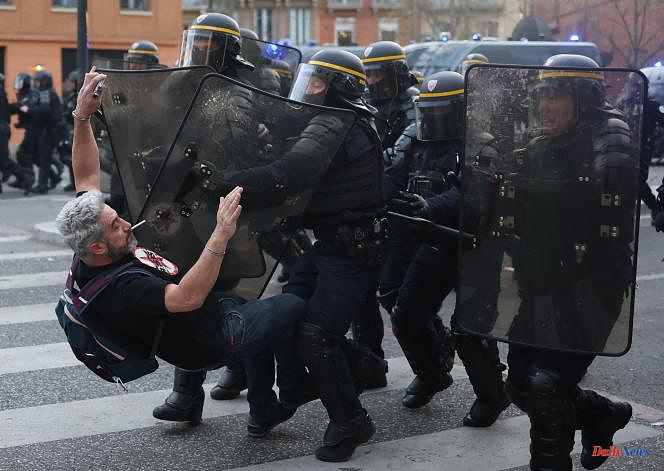The Council of State must rule urgently, Wednesday, April 5, on the appeal of four organizations asking that the obligation to wear the repository of identities and organization (RIO), which makes it possible to identify police officers and gendarmes during law enforcement operations, is made effective by the authorities and the government.
On 29 March, an interim order in which they believe that the right to demonstrate, the right of the press and the right to hold the administration to account are threatened by the absence of the port of this number, composed of seven digits, which must appear on their chasuble below the label "policeman". The summary procedure, which can only be activated in the event of "serious and manifestly illegal infringement of a fundamental freedom", completes a first appeal filed in September 2022 and still under investigation.
Faced with an increase in reports for police violence, during demonstrations against pension reform or against mega-basins in Saint-Soline (Deux-Sèvres), the organizations are advancing the necessary protection of demonstrators and the defense of their right to legal recourse. . In his summary, Patrice Spinosi, lawyer for the LDH and ACAT, considers that because of the difficulty, or even the impossibility, of identifying the agents responsible for violent acts during administrative or judicial investigations, the victims " deprived of any effective protection of their fundamental freedoms".
No prosecution for absence of RIO
"This failure [to wear the RIO] contributes to maintaining a feeling of impunity in the exercise of abusive and illegal violence, which members of the security forces have recently demonstrated", wrote the four organizations. in press release. "This situation is incompatible with the rule of law and damages the relationship between citizens and their police," they add.
Paul Mathonnet, lawyer for the Syndicat des avocats de France as well as the Syndicat de la magistrature, considered during the hearing before the highest administrative court on Monday that the absence of the RIO, "generalized" and "systematic" within the law enforcement, is "documented". In addition, for Me Mathonnet, quoted in a report by Agence France-Presse (AFP), "it is proven that a third" of the procedures on the actions of the police are abandoned due to the absence of elements or information allowing the identification of the police officers involved.
Pascale Léglise, Director of Public Liberties and Legal Affairs of the Ministry of the Interior, considered for her part before the Council of State that "most agents" wear their RIO, made compulsory in 2014 to fight against controls at the facies. The absence of RIO on the uniform has never given rise to prosecution but could be considered, by justice, as an aggravating circumstance in the event of default by the latter. Pascale Léglise declared at the hearing that eighteen "reminders" had been carried out by the police hierarchy since the start of the system to repeat the instructions. Unions and associations propose to "empower unit managers" by launching disciplinary proceedings in the event of non-wearing of the RIO by one of their agents.
Covered officials "recognizable" to the ministry
Since the beginning of the protest movement against the pension reform, thirty-six judicial investigations have been opened by the General Inspectorate of the National Police (IGPN) and two by the General Inspectorate of the National Gendarmerie (IGGN) for disproportionate use force – including mobilization at Sainte-Soline. All the civil servants targeted by the investigations are "perfectly recognizable and recognized", had hammered the representative of the Ministry of the Interior during her hearing at the Council of State, considering that the RIO is not essential.
At the microphone of Franceinfo on Tuesday, the defender of rights, Claire Hédon, illustrated the need for wearing RIO by citing the example of one of her investigations, during which a police officer accused of violence "is not identifiable [and ] has no visible RIO. We were unable to find out who it was in our investigation. The police around say they don't know who he is. However, we see him at one point talking with the police. He is not identifiable. We couldn't ask for a sanction against him."
The sociologist Sebastian Roché considers for his part that the lack of readability of the RIO prevents its use. "It's the size of confetti," he laments. “There is a problem with the sincerity of the government regarding the desire to control the action of the agents. If we really wanted to do it, we would put big numbers on their backs in twenty by twenty, ”comments the research director at the CNRS.












